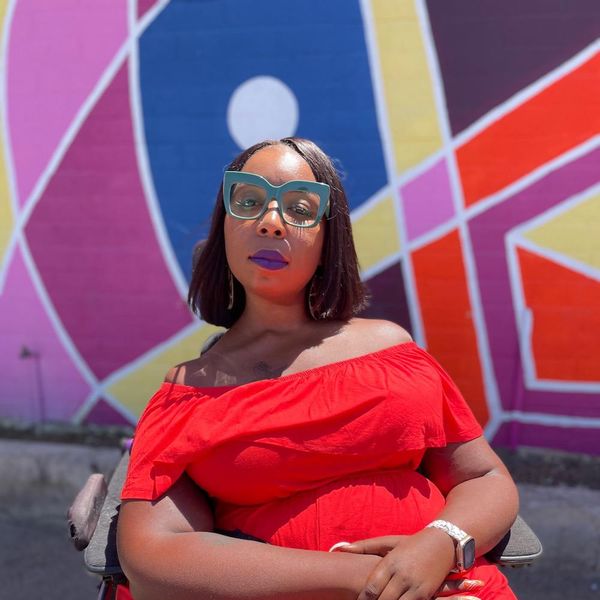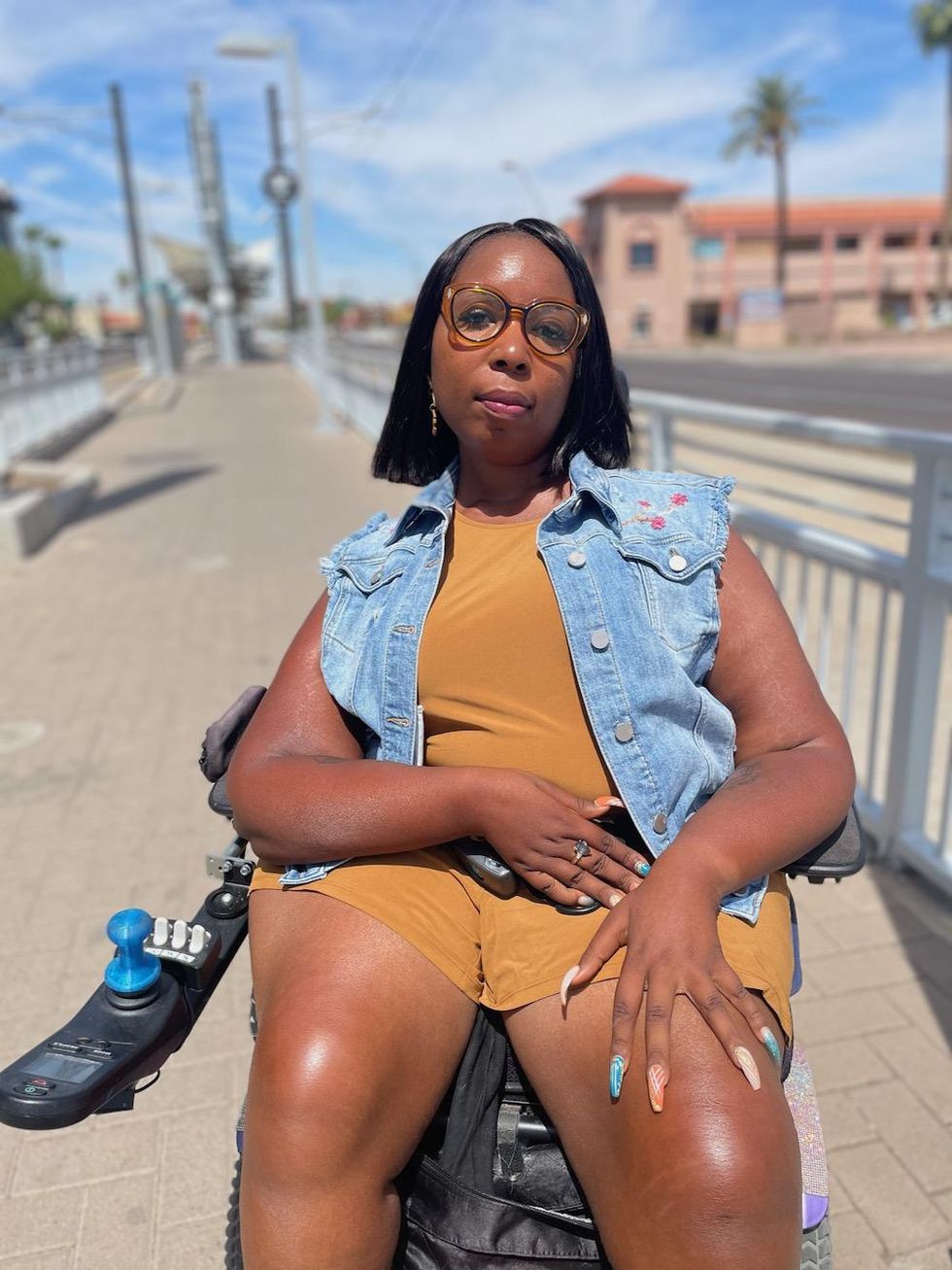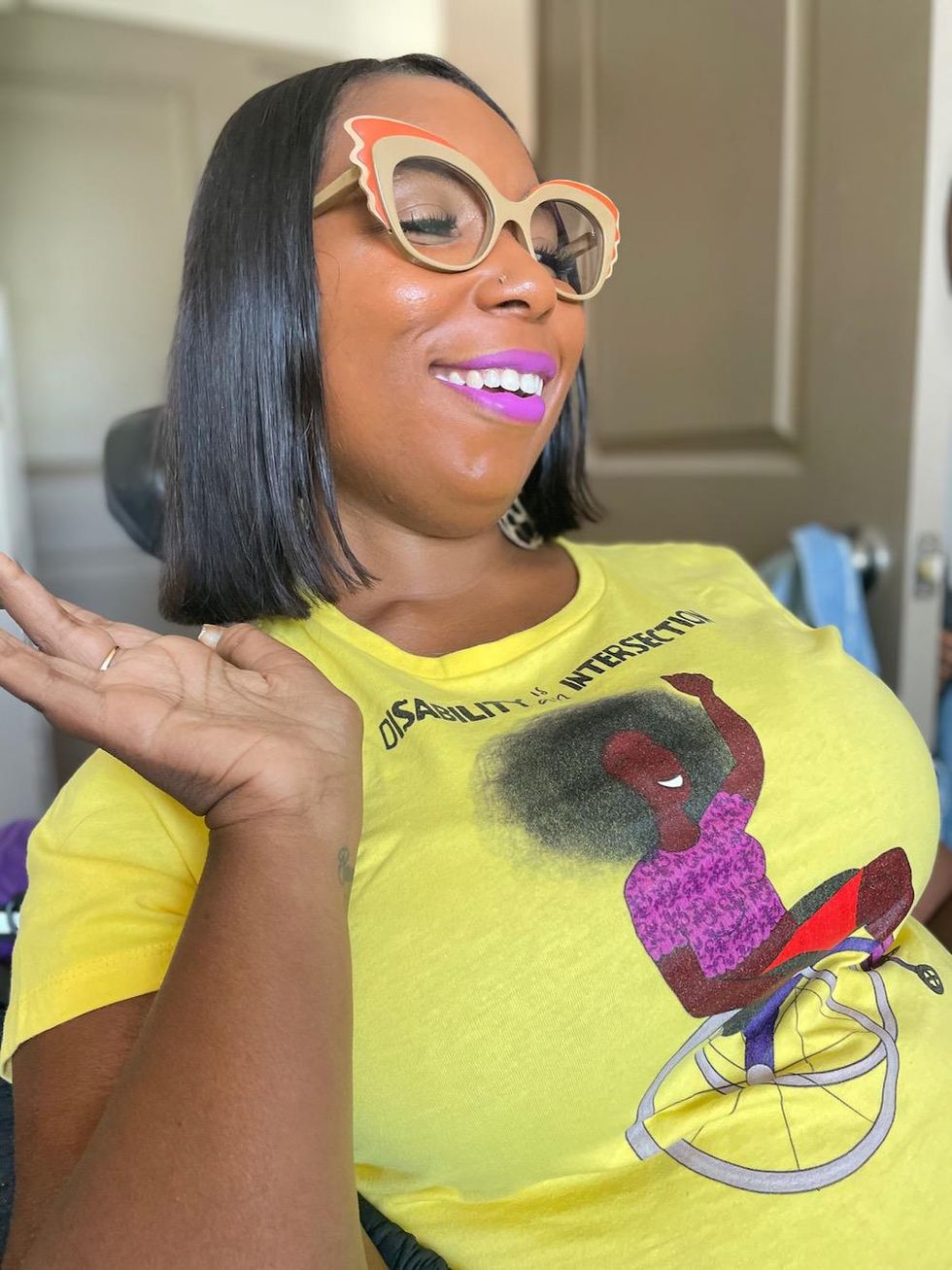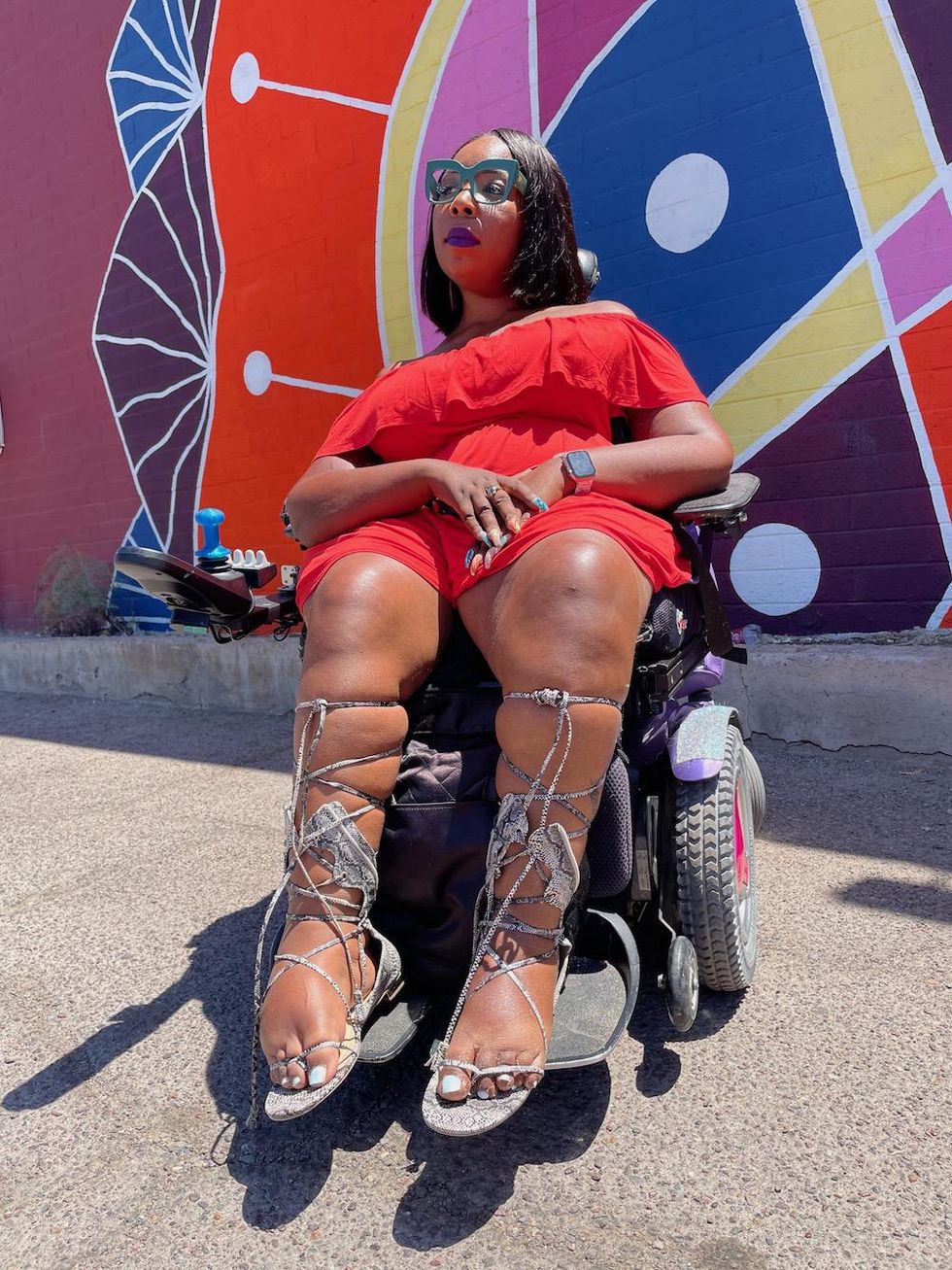
Andraéa LaVant Is an Inclusion Consultant With Style
by Evan Ross Katz
Jun 07, 2021
Disability inclusion expert, activist and all around HBIC Andraéa LaVant first came on my radar after making history as the first visibly disabled Black woman to attend the Oscars. Obsessed with her dress and the gleaming smile on her face, I had to know more. Of course, I was late to the game on this, as LaVant's work, and her commitment to it, has long been making an impact, across industries.
Though her days are spent running her own consulting business, LaVant still found time to devote over a year of work to her title as Impact Producer for the Netflix documentary Crip Camp, executive produced by President Barack and Mrs. Michelle Obama. She couldn't have been prouder when the film was nominated for Best Documentary Feature at the ceremony. She also couldn't have anticipated that she'd be among the few chosen to represent the film at one of the first in-person award shows in over a year.
"As my wheels hit that Oscars red carpet, I decided I'd remain committed throughout the night to absorbing everything about each moment," she says. "From the décor to the kind staff and celebrities to the accessibility features throughout, I couldn't have felt more welcome. It's rare that I enter a space and feel like I belong there, but I really felt like I did." LaVants work has long been dedicated to fortifying a seat at the table for not just herself, but others within the disabled community, particularly disabled people of color.
Below, LaVant talks about her experience at the ceremony, the whitewashing of disability representation throughout history and shares a heartfelt message to her younger self.
Talk to me about the outfit you wore, and how you found that gorgeous dress.
I am all about making a statement! Years ago, I went through a process of embracing my full identity as a Black, physically disabled woman. Within that journey toward self-acceptance, I decided that if people were going to stare, I'd give them something FABULOUS to stare at, and the Oscars was the perfect moment to do just that. As much as I do have a passion for fashion, I also had about three weeks to select an outfit. This meant I'd need help. I reached out to a DC-based stylist, Keri Crutchfield, who I'd admired from afar for years. As a wheelchair user, I couldn't assume that a stylist who generally shops for non-disabled body types would be willing to stretch their skills for me in my seated position. Thankfully, Keri was up for the fun. A few days after speaking with Keri, I had a fully curated lewk waiting in my inbox for me to approve that was far more than I could've dreamed. Crafted by Atlanta-based designer, Oyemwen, the glamour of this gown was a sight to behold, yet that was not the most meaningful aspect of the dress to me. This was the first time I'd had something custom made to fit my unique proportions and that considered the aesthetic of the dress from my seated position. We took attention to specific details, including the length of the dress, height of the split and depth of the neckline. Ultimately, this left us with a stunning sequined gown that was comfortable to wear all night in my wheelchair and that fit like a glove.

How spectacular — especially the attention to the fact that the dress would be seen from a sitting position and thus benefitted from proportions that kept this in mind. Favorite celebrity run-in?
Well, thanks to my service dog, Goji, who accompanied me to the event in complimentary lavender sequins, I had a very literal run-in. Apparently, she is a fan of red and as we approached to greet THE Angela Bassett, Goji trampled over Ms. Bassett's gorgeous red train. Thankfully, she is as gracious as she seems, and not only excused Goji from almost damaging her dress, but so kindly took a beautiful photo with us.
You made history as the first visibly disabled Black woman at the award show. Why is the word "visible" so important in this instance?
There remains a societal stigma that disability is always something people can see, which is totally not the case. From mental health needs to learning disabilities to chronic health conditions, there are millions of people in our country with invisible disabilities. Recognizing this, it's important to me to make sure people know that I'm not claiming to be the first disabled Black woman on the Oscars red carpet (I can think of people like Whoopi Goldberg and Halle Berry, both of whom are Oscar-winners and have invisible disabilities). Rather, I'm the first Black woman on the red carpet with a disability people can identify based on my physical appearance.
What did working on Crip Camp teach you about the disabled community that you maybe didn't know going into the project?
It's funny, because when I joined the Crip Camp team, I had been working on disability-focused issues for over a decade. I thought I knew much of what there was to know. I couldn't have been more incorrect. Crip Camp has served as a daily reminder that disability is as complex and nuanced as any cultural group can get; however, we are the epitome of the truth that we are much stronger and more likely to affect change when we come together as a community.
You once wrote "disability has historically been presented as a white person's experience, this couldn't be further from the truth." Tell me more about this, please.
There's a hashtag that disability advocate and my good friend, Vilissa Thompson, coined a few years back, #DisabilityTooWhite. It calls out the lack of visibility of non-white disabled people in the media and disability spaces overall. Historically, and even until now, most of the narratives we hear or stories we see about disability are depicted from the experiences of white disabled people, particularly white disabled men. Yet, statistics prove that one in four Black adults are disabled, one in six Latinx adults are disabled, one in 10 Asian adults are disabled… the list goes on. This then reveals that the stories of disabled people of color are simply being ignored. This lack of visibility ultimately affects our self-worth and overall sense of belonging.
I know you were an avid reader growing up and cite Toni Morrison and Zora Neale Hurston as some of your favorite authors. What did you discover through these writers' work or other works that you love?
I discovered both Toni Morrison and Zora Neale Hurston in my pre-teen years. While at the time I didn't understand everything about the words they so eloquently strung together, the one thing I could glean was their authentic, unapologetic way of being. Even within the vernacular of the narratives they told, it was clear they weren't concerned about conforming to the world around them; rather they were choosing to let outsiders get a glimpse into the worlds of those they portrayed. Those were some of my first glimpses of radical acceptance and strength. Not caring what others think about you and being so confident about who you are that you can invite them along for the ride.

You wrote about being very dependent on others growing up as a result of your disability. How did this impact your perception of your inner strength and what did you do to fortify the belief that this did not make you weak?
The primary depictions of disability that I saw growing up portrayed us as sick and in need of repair, sad and in need of charity or overly inspirational in need of shock and awe. As such, I had a warped sense of worth and value, and certainly didn't consider myself strong. Over the years, I've come to truly embrace the disability justice principle of interdependence.
And what is that exactly?
Interdependence guides us away from the idea that disabled people are burdens that need to be rescued and toward the truth that we all have value and things to offer one another. While I may require physical support to get out of bed each day, I support those in my chosen community in a variety of other ways. By meeting one another's needs, we have a greater chance of experiencing collective liberation.
Your company's mission is to help brands "speak disability with confidence." I love the specificity. Tell me this: what does it mean to lack confidence when speaking disability?
The most common barrier we face when working with brands and organizations around disability is fear. Whether it's fear of legal repercussions or simply of offending disabled people, we find that most companies don't avoid addressing disability because they don't want to, they avoid it because they're too scared to get it wrong. So, our goal is to meet companies where they are, in a very judgment-free manner. We support their journey toward confidently addressing their internal and external practices related to disability inclusion and belonging. This includes addressing things like ableist language, implicit bias, and so much more.
What's one question you'd like to be reframed when being questioned about disability rights issues?
I don't know if it's so much a question, but an approach that needs to be reframed. All too often, people considering aspects of disability rights (for example reasonable accommodations) do so very reactively or as an afterthought. Typically, they're responding to a request for accessibility features. For example, they're hosting an event, and someone requests a sign language interpreter, so they scramble to find one... or they hire a neurodiverse person and realize they don't have a quiet space for the person to take time alone. I'd love for decision makers of all kinds to reframe their approach to disability inclusion and engagement to one that's more proactive. One where they prioritize access for all from the very beginning of their strategy and planning processes. Most importantly, an approach where they ensure disabled people are a part of all decision making. Nothing about us without us.

What message do you have for your younger self about the work you're doing today, the barriers you've crossed and the person you've become?
Young Andraéa, there's no amount of makeup you can put on, nor shoes you can buy, nor credentials you can add to your name that will erase the pieces of you that make you uniquely you. I wish I could describe what's in store for you. The very things about yourself that you're trying to get everyone not to see will one day become the aspects of your identity that will play a role in changing the world. One day, you will be so proud to stand out. One day, you will enter every space, aiming not to hide anything. One day, you will be the example you never got to see. And, most importantly, one day you will gracefully, but fabulously, bulldoze down doors that you'd never thought you'd enter… not solely for yourself, but for all those that roll through thereafter.
Welcome to "Wear Me Out," a column by pop culture fiend Evan Ross Katz that takes a look at the week in celebrity dressing. From award shows and movie premieres to grocery store runs, he'll keep you up to date on what your favorite celebs have recently worn to the biggest and most inconsequential events.
Photos courtesy of Andraéa LaVant
MORE ON PAPER
ATF Story
Madison Beer, Her Way
Photography by Davis Bates / Story by Alaska Riley
Photography by Davis Bates / Story by Alaska Riley
16 January
Entertainment
Cynthia Erivo in Full Bloom
Photography by David LaChapelle / Story by Joan Summers / Styling by Jason Bolden / Makeup by Joanna Simkim / Nails by Shea Osei
Photography by David LaChapelle / Story by Joan Summers / Styling by Jason Bolden / Makeup by Joanna Simkim / Nails by Shea Osei
01 December
Entertainment
Rami Malek Is Certifiably Unserious
Story by Joan Summers / Photography by Adam Powell
Story by Joan Summers / Photography by Adam Powell
14 November
Music
Janelle Monáe, HalloQueen
Story by Ivan Guzman / Photography by Pol Kurucz/ Styling by Alexandra Mandelkorn/ Hair by Nikki Nelms/ Makeup by Sasha Glasser/ Nails by Juan Alvear/ Set design by Krystall Schott
Story by Ivan Guzman / Photography by Pol Kurucz/ Styling by Alexandra Mandelkorn/ Hair by Nikki Nelms/ Makeup by Sasha Glasser/ Nails by Juan Alvear/ Set design by Krystall Schott
27 October
Music
You Don’t Move Cardi B
Story by Erica Campbell / Photography by Jora Frantzis / Styling by Kollin Carter/ Hair by Tokyo Stylez/ Makeup by Erika LaPearl/ Nails by Coca Nguyen/ Set design by Allegra Peyton
Story by Erica Campbell / Photography by Jora Frantzis / Styling by Kollin Carter/ Hair by Tokyo Stylez/ Makeup by Erika LaPearl/ Nails by Coca Nguyen/ Set design by Allegra Peyton
14 October




